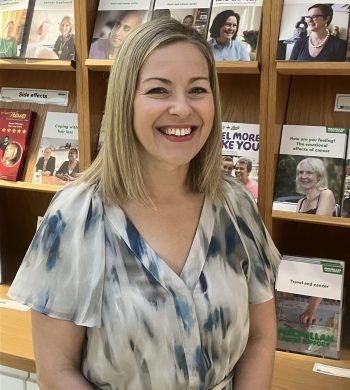25/09/2024

Tell us a little bit about yourself and your background?
“I worked in the Trust’s Health Improvement Department for over 20 years before moving to a temporary post managing the Macmillan Health & Wellbeing Campus at Altnagelvin 18 months ago.”
What drew you to a career in the healthcare sector?
“I was interested in how social, emotional and economic factors influence our health and wellbeing and how I could support people to live as well as possible despite various health challenges.”
When did you join the Trust and what did you do before that?
“I joined Western Trust in 2001 shortly after graduating with a degree in Health Promotion. I worked part-time in the catering and retail industries while studying and volunteered with different charities which helped me gain transferable skills like communication and working with the public.”
Can you tell us a little bit about what you do in your day-to-day job?
“The Macmillan Campus hosts a range of individual and group supports for people impacted by cancer and other long-term conditions. Services include counselling, benefits advice, complementary therapy, pain and fatigue management workshops and social groups like crochet and arts and crafts. We also operate a drop in service where people can call for information and we signpost to services provided by our amazing Trust and community and voluntary sector colleagues. My role is to maximise the services offered at the Campus and ensure people know about the range of supports available Trustwide.”
How would you describe working in the north west?
“I’m proud to have enjoyed a long career in the health service and see colleagues in all disciplines go above and beyond to deliver the best possible services for those who live in our community every day.”
What is the most challenging aspect of your job?
“It can be difficult to witness the fear, anxiety and pain experienced by those impacted by cancer and other long-term conditions but this is often tempered by positivity, hope, resilience and gratitude to the health service staff who care for them.”
What is the most rewarding aspect of your job?
“Feeling you have made a difference by offering a listening ear and information on support services which you later hear made a real difference to someone’s wellbeing when they felt at their most vulnerable.”
Can you recall your happiest moment or moments to date in your job?
“Last Christmas Santa, Mrs Clause and a very mischievous elf paid a surprise visit to the Macmillan Campus where children impacted by cancer were participating in an art therapy programme with their families. The shrieks of delight and beaming faces were magical. And that was just the adults.”
What would you say are the benefits of being based in the North West?
“We have so much to be proud of in the North West – our music and culture scene, great places to eat, vibrant local festivals and we’re a gateway to both the stunning North coast and scenic Donegal.”
What would you say to someone who was considering following in your footsteps and either working or relocating to the North West?
“Derry is the centre of the universe. Why would you even consider living anywhere else? The people, the camaraderie and the sense of humour will buoy you through the most difficult of days.”
Can you tell us one thing about yourself that people might not know? (e.g. outside interest, hobby, family, sport, likes, dislikes)
“My claim to fame was giving an after dinner speech at the House of Lords about being a carer for my dad who had dementia. The food was a bit disappointing!”
If you had one wish in life, what would it be?
“That people with a cancer and long-term health conditions are supported to live long, healthy and fulfilled lives.”
Can you remember your first patient? First day?
“A patient arrived very distressed having just received a cancer diagnosis and didn’t know how to go home and tell their family. As I was new to the role I was terrified I would say the wrong thing but we chatted over a cup of tea and they left knowing what supports were available and feeling empowered that they could handle the next steps. They returned to access various supports for themselves and their family and I felt I had made a difference.”




